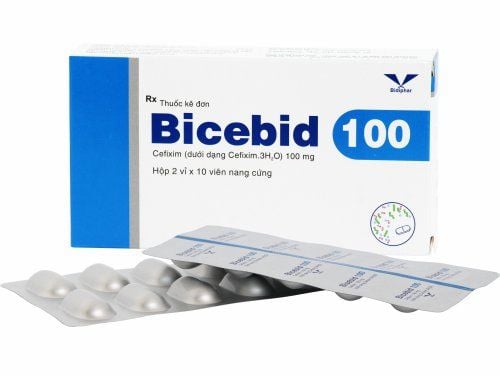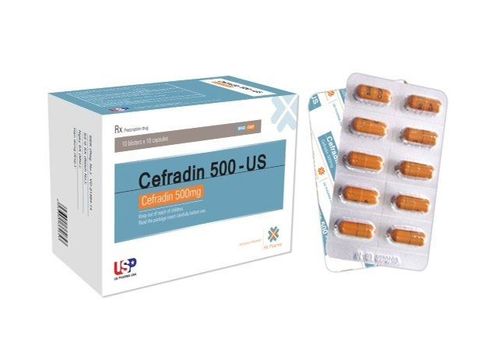This is an automatically translated article.
Moxacin 250mg is indicated in the treatment of upper respiratory tract infections, lower respiratory tract infections caused by streptococci, pneumococcus, skin infections,.... Let's find out the necessary information about Uses of Moxacin 250mg through the article below.
1. What is Moxacin 250mg?
Brand name: Amoxicillin - 250mg
Presentation: Moxacin 250 mg is made in powder form for oral suspension
Packing: box of 10 packs, 12 packs x 1.2g
Classification: Moxacin 250 mg belongs to the group of prescription drugs ETC
Registration number: VD-20067-13
Manufacturer: Domesco Medical Import-Export Joint Stock Company - Vietnam
Ingredients of Moxacin:
Amoxicillin trihydrate equivalent to Amoxicillin anhydrous 250mg Excipients: Moon sugar, Xanthan gum, Acesulfam K, Sodium benzoate, Orange flavor powder, Colloidal silicon dioxide.
2. Uses of Moxacin 250 mg
Indications
Infections caused by susceptible bacteria:
Upper respiratory tract infections, sinusitis, otitis media. Lower respiratory tract infections caused by streptococci, pneumococci, non-penicillinase-producing staphylococcus and H. influenzae. Uncomplicated urinary tract infections. Gonorrhea. Bile duct infection. Skin and muscle infections caused by streptococcus, staphylococcus, E. coli sensitive to amoxicillin. Lyme disease in children or pregnant or lactating women. Chlamydia trachomatis infection of the urogenital tract in erythromycin-intolerant pregnant women. Anthrax disease. Gastroenteritis (including Salmonella enteritis, not bacillus dysentery), endocarditis (especially for prophylaxis in patients undergoing surgery or tooth extraction), typhoid fever and paratyphoid fever. Combination with other drugs in the treatment of H. pylori infection in patients with peptic ulcer. How to use - Dosage of Moxacin 250 mg
How to use:
Moxacin 250 mg is used orally.
Subjects of use
The patient uses the drug as prescribed by the doctor.
Dosage:
Sensitive bacterial infections in the ear, nose, throat, skin, urinary tract: + Adults:
Mild and moderate infections: 250mg every 8 hours or 500mg every 12 hours.
Severe infections: 500mg every 8 hours or 875 mg every 12 hours.
+ Children:
Mild, moderate infections: 20 mg/kg/day every 8 hours or 25 mg/kg/day every 12 hours.
Severe infections: 40 mg/kg/day every 8 hours or 45 mg/kg/day every 8 hours.
Helicobacter pylori infection: + Adults: 1g of amoxicillin orally twice a day, in combination with clarithromycin 500 mg + omeprazole 20 mg orally twice a day (or lansoprazole 30 mg orally twice a day) for 7 days. Then, take 20mg of omeprazole (or 30mg of lansoprazole) daily for 3 more weeks if duodenal ulcer is advanced, or 3 to 5 weeks if peptic ulcer is advanced.
Prophylaxis of infective endocarditis: + Adults: A single dose of 2 g, taken 1 hour before the procedure.
+ Children: A single dose of 50 mg/kg (do not exceed the adult dose), orally 1 hour before the procedure.
Lyme disease: Mild heart inflammation (1st degree or 2nd degree atrioventricular block): + Adults: 500 mg/spread, 3 times/day for 14-21 days.
+ Children under 8 years old: 50 mg/kg/day divided into 3 times (maximum 1.5g/day).
Arthritis, without neurological disorders due to Lyme disease: + Adults: 500 mg/time, 3 times/day for 28 days.
+ Children: 50mg/kg/day divided into 3 times (meaning 1.5 g/day).
Post-exposure prophylaxis after exposure to anthrax spores (biological warfare): + Persons under 40 kg: 45 mg/kg/day in 3 divided doses.
+ Adults > 40kg: 500mg every 8 hours/time.
Patients on hemodialysis: 250 - 500 mg/24 hours depending on the severity of the infection and an additional dose during and after each dialysis session. Missed dose, overdose and handling
Overdose;
There is no specific antidote, amoxicillin can be removed by hemodialysis. Treat symptomatically, paying special attention to the water-electrolyte balance.
Missed dose:
Information on how to handle a missed dose of Moxacin 250 mg is being updated.
3. Notes when taking Moxacin 250 mg
Contraindications
Patients with a history of allergy to penicillin.
Notes/ Precautions
Must periodically check liver and kidney function during long-term treatment. Taking high doses of amoxicillin to people with kidney failure or people with a history of convulsions or epilepsy can cause convulsions, although rarely. Serious hypersensitivity reactions may occur in patients with a history of allergy to penicillins or other allergens, and history of allergy to penicillins, cephalosporins and other allergens should be carefully investigated. In case of renal failure, the dose must be adjusted according to the creatinine clearance or serum creatinine. Less urine is a risk for drug crystallization, must drink a lot of water when taking the drug. In the treatment of Lyme disease, attention should be paid to the possible occurrence of the Jarisch-Herxheimer reaction. There is a high risk of rash in patients with infectious mononucleosis.
4. Side effects of Moxacin 250 mg
Common: External. Uncommon: Nausea, vomiting, diarrhea, erythema, maculopapular rash and urticaria, especially Stevens-Johnson syndrome. Rare: Slight increase in SGOT, agitation, irritability, anxiety, insomnia, confusion, behavioral changes and/or dizziness, anemia, thrombocytopenia, thrombocytopenic purpura, eosinophilia eosin, leukopenia, agranulocytosis. Inform your doctor about any unwanted effects you may experience while using the drug.
5. Drug interactions
Nifedipine increases the absorption of amoxicillin. Patients with hyperuricemia when taking allopurinol with amoxicillin increases the likelihood of amoxicillin rash. There may be antagonism between amoxicillin and bacteriostatic agents such as fusidic acid, chloramphenicol, tetracycline. Methotrexate: Amoxicillin reduces the excretion of methotrexate, increasing toxicity on the gastrointestinal tract and hematopoietic system. Oral contraceptives: Amoxicillin has the potential to reduce the effectiveness of contraception. Typhoid vaccine: Amoxicillin reduces the effectiveness of the vaccine. Warfarin: Studies have not demonstrated an interaction, but experience suggests an anticoagulant effect when warfarin is co-administered with amoxicillin.
Please dial HOTLINE for more information or register for an appointment HERE. Download MyVinmec app to make appointments faster and to manage your bookings easily.













